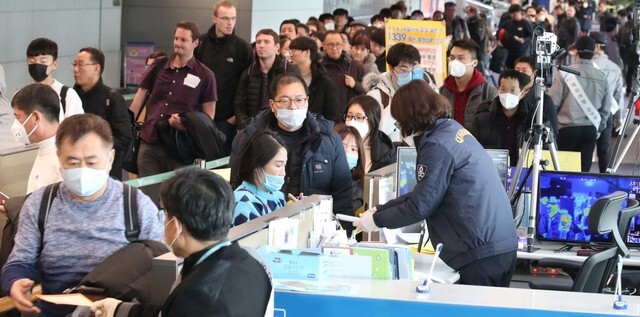hankyoreh
Links to other country sites 다른 나라 사이트 링크
S. Korean government to conduct medical exams for people entering country from Wuhan

The government has decided to conduct an exhaustive survey of the new coronavirus outbreak. The survey will primarily consist of daily medical examinations of the roughly 3,000 people that entered South Korea from the Chinese city of Wuhan, Hubei Province, between Jan. 13 and Jan. 26. The measure follows a Blue House meeting on Monday (Jan. 27), where President Moon Jae-in instructed his top aides to "launch an exhaustive survey of the people who have entered the country from Wuhan."
At a Jan. 28 press conference, Jung Eun-kyeong, director of the Korea Centers for Disease Control and Prevention (KCDC), said: "We are starting a survey of the 3,023 people who entered the country between Jan. 13 and Jan. 26, and are therefore still in the middle of their theoretical incubation period. Local civil servants and inspectors from the Health Insurance Review and Assessment Service will administer daily medical checkups."
The KCDC explained that, along with the medical exams, surveyed individuals will receive infection prevention training and instructions on what to do if they develop suspicious symptoms. Survey subjects also include travelers who had any layovers on their way to South Korea, with 1,166 South Korean citizens and 1,857 foreigners being identified so far. "We have the passports and contact information of South Korean citizens so we will contact them that way," said Jung. "For foreigners who do not have a listed phone number, we will proceed with the survey in cooperation with the National Police Agency."
According to the South Korean government, around 6,000 passengers entered South Korea from Wuhan between Jan. 2 and Jan. 23, the day Wuhan Tianhe International Airport was shut down. Considering the incubation period for the new coronavirus is 14 days, the plan aims to conduct priority medical testing on the some 3,000 passengers whose incubation periods have not yet have passed. In addition, among those receiving daily medical checkups at clinics after being classified as active monitoring targets -- those who exhibited light symptoms after returning from Wuhan -- the 100 or so people still in their theoretical incubation period are currently being tested for infection. The test results are expected to be available as early as Jan. 29.
Nonetheless, conducting an exhaustive survey of all those who traveled to Wuhan presents substantial challenges. So far, the protocol has been to administer a pan-corona test to determine whether the virus in question is a coronavirus, and in the case of a positive result, to analyze the virus' nucleic acid sequence to determine whether the patient in question has contracted the new coronavirus. Because this is a two-step process, it takes a full 24 hours to complete and supplies of testing agents are also limited. This is the reason that patients exhibiting suspicious symptoms are being prioritized for testing. "We have developed and are currently trialing a new testing method for the novel coronavirus that takes around six hours," said Jung. "Our goal is to implement this new test by late January at Research Institutes of Public Health and Environment, and by Feb. 5 at private medical facilities."
By Park Hyun-jung, staff reporter
Please direct comments or questions to [english@hani.co.kr]

Editorial・opinion
![[Editorial] Yoon must halt procurement of SM-3 interceptor missiles [Editorial] Yoon must halt procurement of SM-3 interceptor missiles](https://flexible.img.hani.co.kr/flexible/normal/500/300/imgdb/child/2024/0501/17145495551605_1717145495195344.jpg) [Editorial] Yoon must halt procurement of SM-3 interceptor missiles
[Editorial] Yoon must halt procurement of SM-3 interceptor missiles![[Guest essay] Maybe Korea’s rapid population decline is an opportunity, not a crisis [Guest essay] Maybe Korea’s rapid population decline is an opportunity, not a crisis](https://flexible.img.hani.co.kr/flexible/normal/500/300/imgdb/original/2024/0430/9417144634983596.jpg) [Guest essay] Maybe Korea’s rapid population decline is an opportunity, not a crisis
[Guest essay] Maybe Korea’s rapid population decline is an opportunity, not a crisis- [Column] Can Yoon steer diplomacy with Russia, China back on track?
- [Column] Season 2 of special prosecutor probe may be coming to Korea soon
- [Column] Park Geun-hye déjà vu in Yoon Suk-yeol
- [Editorial] New weight of N. Korea’s nuclear threats makes dialogue all the more urgent
- [Guest essay] The real reason Korea’s new right wants to dub Rhee a founding father
- [Column] ‘Choson’: Is it time we start referring to N. Korea in its own terms?
- [Editorial] Japan’s rewriting of history with Korea has gone too far
- [Column] The president’s questionable capacity for dialogue
Most viewed articles
- 1Months and months of overdue wages are pushing migrant workers in Korea into debt
- 2Trump asks why US would defend Korea, hints at hiking Seoul’s defense cost burden
- 3At heart of West’s handwringing over Chinese ‘overcapacity,’ a battle to lead key future industries
- 4[Editorial] Yoon must halt procurement of SM-3 interceptor missiles
- 5[Guest essay] Maybe Korea’s rapid population decline is an opportunity, not a crisis
- 6Fruitless Yoon-Lee summit inflames partisan tensions in Korea
- 7Dermatology, plastic surgery drove record medical tourism to Korea in 2023
- 8First meeting between Yoon, Lee in 2 years ends without compromise or agreement
- 91 in 3 S. Korean security experts support nuclear armament, CSIS finds
- 10AI is catching up with humans at a ‘shocking’ rate